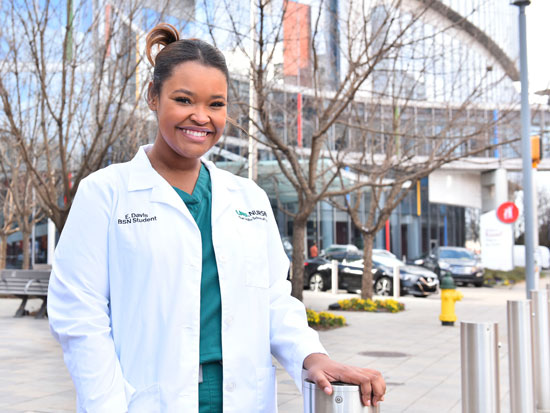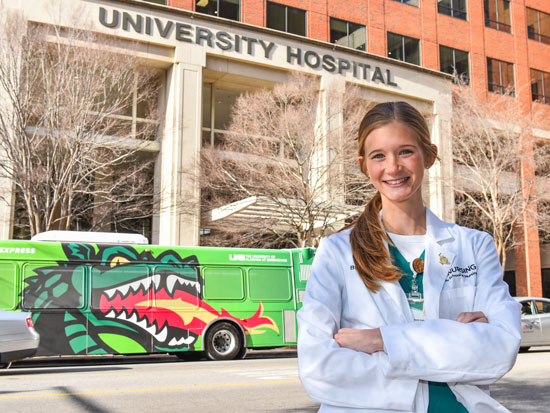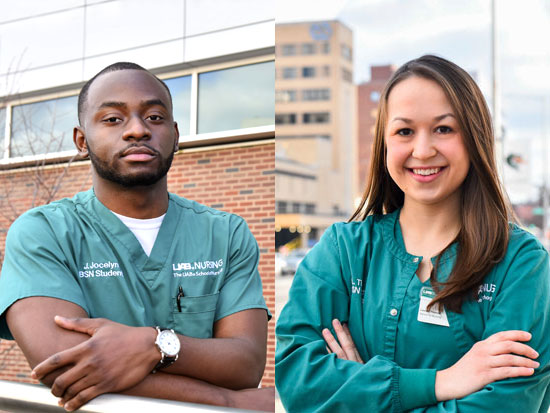The University of Alabama at Birmingham School of Nursing is working with its on-campus clinical partners to support nursing workforce development during the critical nursing shortage, connecting students with opportunities to work as support personnel in the hospitals gaining real-world experience in health care to help ease their transition to the professional nursing role while also earning money during school.

Fourth semester Bachelor of Science in Nursing student Emily Davis has wanted to be a nurse for as long as she can remember. As a student nurse intern at Children’s of Alabama, she is taking steps to make that dream a reality.
“I’m passionate about the well-being of children, young adults and their families,” Davis said. “This is giving me the opportunity to explore my future career and learn from other nurses and health care professionals who have been in my shoes.”
Davis is part of the Student Nurse Intern Program, a partnership between the School and Children’s of Alabama that allows nursing students an opportunity to work in a clinical extender position. Director of Nursing Professional Development at Children’s, Alyssa Cooper, MSN, RN, NPD-BC (BSN 1987), explained that the students learn more about what a nurse really does on a daily basis.
“These Clinical Extenders are paired directly with a bedside nurse, gaining insight into communication and interactions between nurses and caregivers, patients and other members of the multidisciplinary team,” Cooper said. “The nursing student becomes a competent, confident member of the health care team, learning firsthand the meaning of teamwork and developing useful skills.”
Associate Professor Tedra Smith, DNP, CRNP, CPNP-PC, CNE (MSN 2004, DNP 2011), said the School’s partnership with Children’s provides valuable, on-the-job experience to help make the transition from school to clinical practice less stressful for new nurses.
”This opportunity not only benefits the student but the hospital as well. Students can transition into the role of a pediatric nurse with more confidence to implement the nursing process in a pediatric setting as well as a knowledge of the policies and procedures within Children’s,” Smith said. “This includes foundational knowledge of the electronic health record which causes a lot of anxiety for new nurses. It aligns with our mission of preparing our graduates to excel in practice.”

UAB Hospital, which offers positions as nursing student graduate aides and patient care technicians, and the Birmingham VA Medical Center, which has student nurse technicians and graduate nurse technicians, also partner with the School on these initiatives.
With the nursing shortage, students are helping to fill critical needs through these health care support positions in the short term and long term, said UAB School of Nursing Instructor Jennie Alspach, DNP, MSN, RN, FNP-BC (BSN 1996, MSN 1999, DNP 2020), who also coordinates the UAB program for the School.
“The goal is to provide the hospitals a pathway to recruit and retain new nurses while allowing students to gain real-world experience that will benefit their transition to the professional RN role,” Alspach said. “Students will transition after graduation with greater confidence and less stress, two key components to job satisfaction.”
Alspach said a key benefit to participating in the program is that students gain first-hand insight into the nurse’s role as a member of an interprofessional disciplinary team. They also learn about a variety of patient populations and get to know the work culture within the health system where they are likely to work after graduation.
“The program aligns with the School’s mission by supporting practice-focused outcomes and preparing diverse leaders who excel in practice, scholarship and education,” Alspach added.
The experience at UAB Hospital has prepared Skye Ingram for life after nursing school. “It’s made a huge impact on me,” she said.
Ingram remembers applying during her third semester of nursing school. “At the time, I was very anxious at clinicals and wanted to grow my confidence in performing nursing skills and providing patient care. After starting this job, I watched myself grow and become more and more confident with each shift. Now I get excited to provide patient care and learn new things.”
Like many students in the program, Ingram has accepted a position at UAB Hospital after graduation.
“The benefit has been immense during a time we have needed it the most,” said Jill Stewart, DNP, RN, CNOR (DNP 2010), Associate Vice President for Nursing Quality and Clinical Excellence for UAB Medicine. “The nurse students have come into the inpatient environment as a nursing student graduate aide and have an opportunity to join the team. They have been able to apply the skills they have learned during their undergraduate curriculum, and they start to have a level of comfort in the application of those skills. It has given the students a unique and new opportunity to grow professionally.”

UAB School of Nursing Assistant Professor Randy Moore, DNP, RN (BSN 1993, MSN 2004, DNP 2012), who coordinates the School side of the program with the Birmingham VAMC, has seen student nurse technicians find their career path through the program.
“Once you figure out the culture, who people are and how to get things done it makes it that much less you have to learn when you start day one as a new nurse. You’re able to come to the table with some knowledge already,” Moore said.
For students Jean Jocelyn and Lauren Thomas, the experience has inspired them.
“This gives UABSON students the opportunity to provide care to a special population that is often overlooked and misunderstood,” Jocelyn said.
“I’ve found my passion. I want to make a career through the VA, and this program has made that possible,” Thomas said. “For me, the biggest benefit was networking and finding what unit I see myself working in once I graduate, all while serving those who served our country.”
